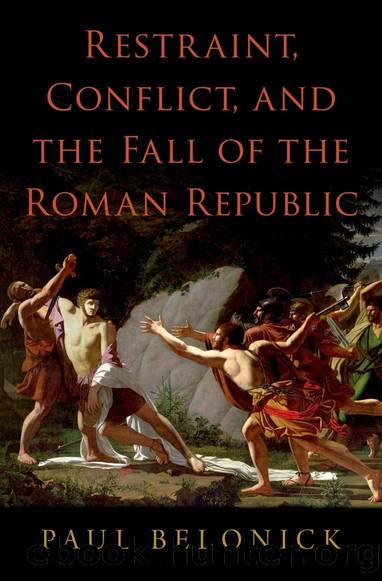Restraint, Conflict, and the Fall of the Roman Republic by Paul Belonick

Author:Paul Belonick [Belonick, Paul]
Language: eng
Format: epub
ISBN: 9780197662663
Google: dyqdEAAAQBAJ
Amazon: B0BNVZX4X2
Barnesnoble: B0BNVZX4X2
Goodreads: 62855229
Publisher: Oxford University Press USA
Published: 2022-05-15T00:00:00+00:00
Similarly, Gaius Gracchus could say that âit is inescapable that a man who approves of dishonest men will disapprove of honest men,â and from that premise could conclude that those who killed his brotherâgreat nobles allâwere in fact pessimi. The trouble was that Gaiusâ enemies and Luciliusâ marks would have agreed with these all-purpose statements. The nub of debate was over who qualified as honestus, and in these decades answers were unpredictable. Everyone might believe in the abstract that a luxurious or libidinous man was malus. But Tiberius Gracchusâ episode revealed that a senator husbanding a fine estate was now a divisive character to a degree never seen before: intemperate and greedy (and thus no legitimate judge) to some, traditional and upright (and thus worthy of deference) to others.61
The last key after-effect was an important mental leap that sprang from this toggle-switch thinking. We have seen several men to this point in Roman history be unrestrained. Such obstinacy, however, had never been enough to merit death. Yet around the time of the Gracchi a new metaphor (if not yet the legal title, which would come) seems to have been applied for the first time to troublesome citizens: the concept of the hostis, an impudent foreign enemy against whom the use of ruthless force was second nature to the martial Romans.62 Scipio Nasica believed that Tiberius Gracchusâ unprecedented lack of restraint meant that he was actually trying to destroy the Republic. In 131 bc, Scipio Aemilianus judged Tiberius iure caesum (âjustly killedâ), and amplified the point in 129 when a mass of Gracchan supporters shouted for his death as a âtyrant,â to which Scipio casually replied, âThey want to kill meâjust what one would expect from the those who make war on the fatherland.â63 In toggle-switch thinking, normative disagreement was âwar,â and there was no middle groundâand thus no quarter.
A decade later the hostis metaphor recurred when one of Gaius Gracchusâ supporters killed one of the consul Opimiusâ attendants, and Opimius called on a senatorial mob and foreign archers to help put Gaiusâ followers down as though enemies of the state. Even those opposed to Opimius adopted the metaphor: some felt that Opimiusâ dedication of his temple to concordia too much resembled a victorious general arrogantly celebrating a triumph over foreign foes.64 According to many modern scholars, black-and-white exempla of legendary citizen-hostes such as Sp. Maelius, Sp. Cassius, and M. Manlius Capitolinus also gained currency around this time to help justify the brothersâ murders, and indeed at this juncture orators began to use such stories (with their simplistic messages) to justify violence against other malefactors.65 Certainly, if one truly believed that oneâs fellow senatorsâeven oneâs own relatives, in Scipioâs caseâwere on the same moral plane as alien hordes, then mutual deference was in rocky straits indeed.
In sum, in these uncertain decades all agreed that the restraint ideals were powerful, wished to be perceived as following them, and attached political success to them. The political verdict on a man continued to be evaluated in terms of self-control.
Download
This site does not store any files on its server. We only index and link to content provided by other sites. Please contact the content providers to delete copyright contents if any and email us, we'll remove relevant links or contents immediately.
Tasting Mother-In-Law (Mother In Law Son In Law Erotic & Taboo Short Story) (Naughty In Law Book 3) by Rush Penny(409)
EARLY GRAVE (Jake Lassiter Legal Thrillers Book 12) by Paul Levine(368)
Carl Schmitt Between Technological Rationality and Theology by Hugo E. Herrera;(366)
The Love Conspiracy: An Age-Gap Lesbian Romance by Arias J.J(362)
The Rise of Critical Islam by Youcef L. Soufi(355)
HABEAS PORPOISE (Solomon vs. Lord) by Levine Paul(353)
Democratic Quality in Southern Europe by Tiago Fernandes(343)
If We Burn by Vincent Bevins(341)
Natural Rights on the Threshold of the Scottish Enlightenment by Unknown(338)
Tor and the Dark Net · Remain Anonymous Online and Evade NSA Spying (Tor, Dark Net, Anonymous Online, NSA Spying) by Smith James(332)
Toward revealing the controversy of bacterial biosynthesis versus bactericidal properties of silver nanoparticles (AgNPs): bacteria and other microorganisms do not per se viably synthesize AgNPs by Fatthy Mohamed Morsy(295)
Light-evoked depolarizations in the retina of <Emphasis Type="Italic">Strombus <Emphasis>: Role of calcium and other divalent cations by Unknown(288)
Women before the court by Lindsay R. Moore(262)
International Humanitarian Law and Justice by Mats Deland Mark Klamberg Pål Wrange(242)
When Hope and History Rhyme by Douglas Burgess(237)
The Crimes of Womanhood by A. Cheree Carlson(235)
To Raise and Discipline an Army by Joshua Kastenberg(227)
A New Daddy by orphan_account(224)
Witches, Wife Beaters, and Whores by Elaine Forman Crane(223)
